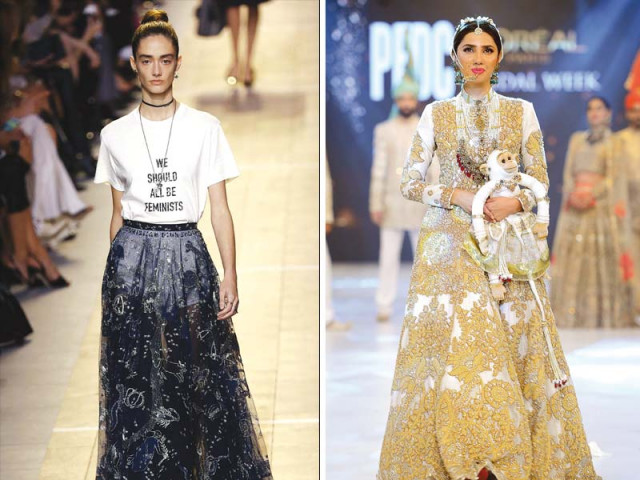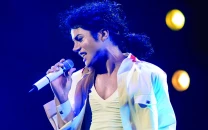The marriage of feminism and fashion
Fashion heavyweights make reformist statements with latest collections at PFW and PLBW

While a model walked for Dior in a white t-shirt that read, ‘We Should All Be Feminists.’ Mahira Khan graced the ramp in an Ali Xeeshan number with a monkey in her hand. PHOTO COURTESY: DRAGONFLY
In today’s consumer-driven world, however, designers dabble with making pro-feminist and reformist statements through fashion slightly differently. In a very smart and strategic move, Maria Grazia Chiuri, Christian Dior’s first female creative director in 70 years, sent a model down the Paris Fashion Week (PFW) runway wearing a white t-shirt that read, ‘We Should All Be Feminists’ and another that said, ‘Dio(r)evolution’.
By doing so, the fashion house has easily placed itself in the middle of a powerful social movement at a time when we are seeing more brands experimenting with pro-feminist campaigns. Instantly and as expected, social media blew up with a #weshouldallbefeminists hashtag and Dior waltzed into mainstream culture.
Although a longstanding one, the marriage of fashion and feminism remains tricky. Chiuri’s feminist sentiments that culminated in splashing pro-feminist and revolutionary messages across t-shirts, feel rather superficial and naïve when compared to the unprompted shifts and pro-feminist protests that have thrived on the streets. Racking up Instagram posts by the second, this moment was easily the most social-media friendly one at PFW. And, it worked well too, because in the digital age everyone is in a hurry to cash in on a new trend before it is discarded. Feminism seems to be the new one.
Morever, only a select few will be able to afford Dior’s ‘feminist tee’ so if the t-shirt is not part of a larger campaign, does the feminist slogan on the runway accomplish anything more than hashtag activism? The same dialogue was initiated closer to home after Ali Xeeshan’s thought provoking close of the Paris L’Oréal Bridal Week (PLBW) show. The presentation was designed to build awareness around child marriages and how women in our society are like monkeys in a circus at their own weddings. Some felt that there was a glaring disconnect with his ideology and what he was selling, i.e. expensive designer clothing that feeds into the idea that weddings are, in fact, a circus show.
However, those who follow Xeeshan’s work can digest the social message more easily – one that he has been championing for a long time now as his ideas are deeply embedded in his design house. From going against the norm and darkening the models’ skin colour to coming under fire for ‘glamourising rape,’ all of his ideas have been building up to this final showcase.
That’s the kind of soft rebellion fashion needs right now, impactful facts, swift moves over a long period of time, rather than forgettable poses or hashtags. In the age of social media, unfortunately, the most calculated of statements get noticed rather than the genuine ones.
Coming back to PFW, Dior’s show was not the first time a brand has acknowledged the existence of women’s rights. Chanel staged a ‘feminist protest’ for their Spring 2015 collection. Models carried hand-painted protest signs, many of which had pro-feminist slogans such as ‘Divorce pour tous’, ‘ladies first’ and ‘history is her story! That show felt like it was using feminism as stage decorations whereas the presentation by Xeeshan seemed more sincere.
While it is true that the more fashion brands that use their runways, social media accounts and ad campaigns as vehicles for change, the more fashion will push the movement forward. But perhaps the brands need to rethink the way they tell their stories.
Published in The Express Tribune, October 10th, 2016.
Like Life & Style on Facebook, follow @ETLifeandStyle on Twitter for the latest in fashion, gossip and entertainment.



















COMMENTS
Comments are moderated and generally will be posted if they are on-topic and not abusive.
For more information, please see our Comments FAQ